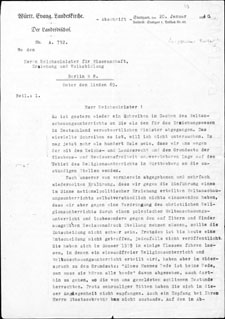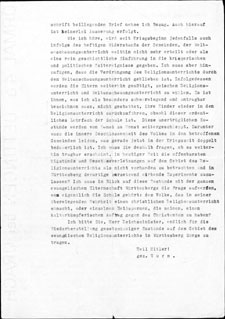Protest against “Weltanschauung Class”
In one of its first offensives, the Nazi regime started converting Christian denominational schools into “German non-denominational schools” in 1936. Resistance, initially extant in Württemberg, too, was given up by the regional church when the Ministry of Education assured that religion class could be taught as before. Consequently, nearly all grade school students in Württemberg attended a “German non-denominational school” on October 1, 1936.
Württemberg Minister of Education Christian Mergenthaler then started attempting in 1938 to replace religion class with a “weltanschauung class”; the church was supposed to be deprived of as many means to influence the young people’s upbringing as possible. Publicity campaigns, substantially supported by the National Socialist Teachers’ Association and exponents of the party, called upon parents to withdraw their children from religion class and register them for weltanschauung class.
Regional bishop Wurm vigorously protested against this campaign, which undermined the pledge of 1936, to the responsible authorities in Württemberg and the Reich several times. Parents were also warned of this class: It is drawn from the rejection of the message of the Bible and the Reformation, is intended to lead children away from the wellspring of divine truth and divine life force and to alienate them from Christian service of god (Hermle, Thierfelder, Herausgefordert, p. 564).
On January 20, 1940, Wurm approached the Reich Minister for Science, Education and National Education Bernhard Rust, responsible for religion class, and presented him the regional church’s protest against the abuses and violations of the law where religion class was concerned and firmly demanded the restoration of conditions governed by law. At any rate, Wurm’s protests seemed to have had the effect that similar attempts were refrained from in other parts of the Reich – for the time being, i.e. during wartime.
Source / title
- © Landeskirchliches Archiv Stuttgart, D1/103


